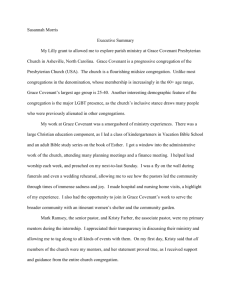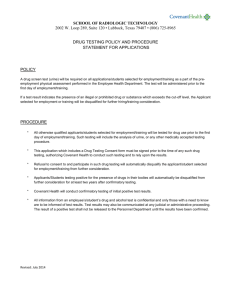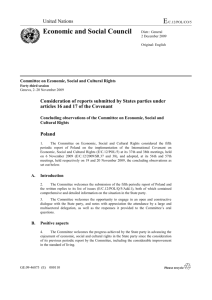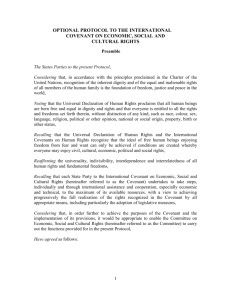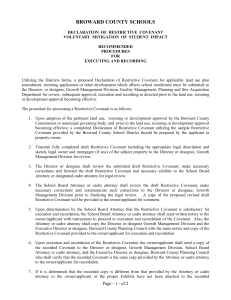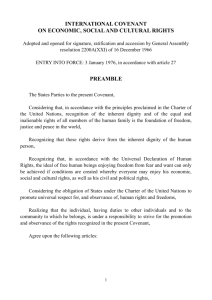Letterhead_OHCHR
advertisement
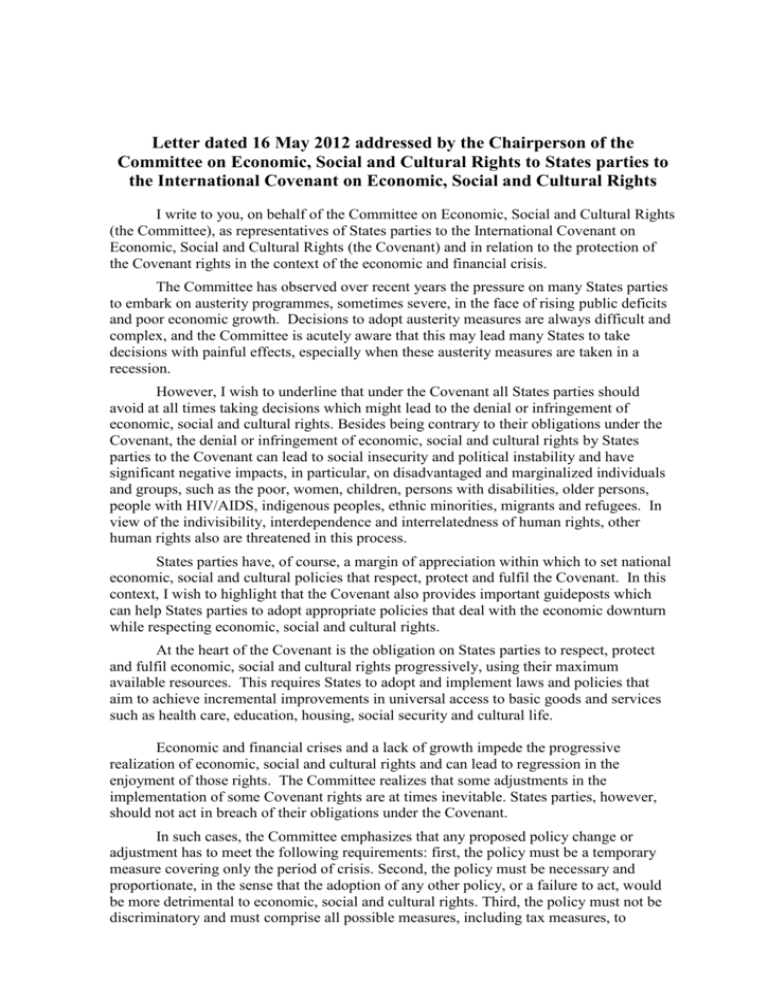
Letter dated 16 May 2012 addressed by the Chairperson of the Committee on Economic, Social and Cultural Rights to States parties to the International Covenant on Economic, Social and Cultural Rights I write to you, on behalf of the Committee on Economic, Social and Cultural Rights (the Committee), as representatives of States parties to the International Covenant on Economic, Social and Cultural Rights (the Covenant) and in relation to the protection of the Covenant rights in the context of the economic and financial crisis. The Committee has observed over recent years the pressure on many States parties to embark on austerity programmes, sometimes severe, in the face of rising public deficits and poor economic growth. Decisions to adopt austerity measures are always difficult and complex, and the Committee is acutely aware that this may lead many States to take decisions with painful effects, especially when these austerity measures are taken in a recession. However, I wish to underline that under the Covenant all States parties should avoid at all times taking decisions which might lead to the denial or infringement of economic, social and cultural rights. Besides being contrary to their obligations under the Covenant, the denial or infringement of economic, social and cultural rights by States parties to the Covenant can lead to social insecurity and political instability and have significant negative impacts, in particular, on disadvantaged and marginalized individuals and groups, such as the poor, women, children, persons with disabilities, older persons, people with HIV/AIDS, indigenous peoples, ethnic minorities, migrants and refugees. In view of the indivisibility, interdependence and interrelatedness of human rights, other human rights also are threatened in this process. States parties have, of course, a margin of appreciation within which to set national economic, social and cultural policies that respect, protect and fulfil the Covenant. In this context, I wish to highlight that the Covenant also provides important guideposts which can help States parties to adopt appropriate policies that deal with the economic downturn while respecting economic, social and cultural rights. At the heart of the Covenant is the obligation on States parties to respect, protect and fulfil economic, social and cultural rights progressively, using their maximum available resources. This requires States to adopt and implement laws and policies that aim to achieve incremental improvements in universal access to basic goods and services such as health care, education, housing, social security and cultural life. Economic and financial crises and a lack of growth impede the progressive realization of economic, social and cultural rights and can lead to regression in the enjoyment of those rights. The Committee realizes that some adjustments in the implementation of some Covenant rights are at times inevitable. States parties, however, should not act in breach of their obligations under the Covenant. In such cases, the Committee emphasizes that any proposed policy change or adjustment has to meet the following requirements: first, the policy must be a temporary measure covering only the period of crisis. Second, the policy must be necessary and proportionate, in the sense that the adoption of any other policy, or a failure to act, would be more detrimental to economic, social and cultural rights. Third, the policy must not be discriminatory and must comprise all possible measures, including tax measures, to 2 support social transfers to mitigate inequalities that can grow in times of crisis and to ensure that the rights of the disadvantaged and marginalized individuals and groups are not disproportionately affected. Fourth, the policy must identify the minimum core content of rights or a social protection floor, as developed by the International Labour Organization, and ensure the protection of this core content at all times. Finally, may I highlight that international cooperation is a fundamental obligation for the progressive universal realization of economic, social and cultural rights. In this regard, the Committee has on many occasions underlined the requirement that States parties to the Covenant should respect their obligations in relation to economic, social and cultural rights when making decisions, including on official development assistance, in international financial institutions, such as the World Bank, the International Monetary Fund, regional financial institutions and regional integration organizations. I therefore wish to express the Committee’s hope that your Government will be guided by its obligations under the Covenant when developing and adopting international and regional programmes to promote economic and social development and to overcome the economic and financial crisis. I take this opportunity to wish you every success in your endeavours and to reiterate the assurances of my highest consideration. (Signed) Ariranga G. Pillay Chairperson Committee on Economic, Social and Cultural Rights __________








